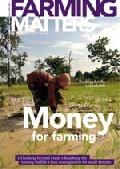More than 124 million acres of land has been acquired by foreign investors responding to global food shortages, fluctuating oil prices and growing water shortages. The phenomenon is being exacerbated by the EU’s mandate that 10 percent of all transport fuel should be sourced from plant-based biofuels by 2015. But land grabs and food aid do not help African farmers, says Rachel Zedeck
Many countries are targets for expanding intensive agriculture. International agribusinesses, banking institutions, sovereign governments and wealthy individuals are being attracted to buy up or lease cheap land, where the use-rights are poorly defined.
Countries ravaged by conflict and sanctions are desperate to attract investment. Land in these countries can often cost less than $1 per year per acre to lease. While these investments appear to represent a win-win situation for both sides, appearances are often deceiving.
More than 124 million acres of land has been acquired by foreign investors responding to global food shortages, fluctuating oil prices and growing water shortages. The phenomenon is being exacerbated by the EU’s mandate that 10 percent of all transport fuel should be sourced from plant-based biofuels by 2015. This will require more than 43 million acres of new land for crop production, which is certainly not available in the EU. This will place enormous additional pressure on land producing food for local consumption, and possibly leave a large gap in the global supply of cereal crops. Increased shortages have already been experienced in recent years, leading to rampant food insecurity in developing countries which ineffective and unsustainable food aid has done very little to address.
While many see these investments as economic progress, the majority of food and biofuels produced in these schemes is designed for export. Simultaneously, indigenous people are being forced off their land or to work for these farms as underpaid labor, while lands used by pastoralists are being swallowed whole. These impacts are independent of the catastrophic ecological damage caused by the majority of commercial farms abusing local water and land resources, with little if any regulation from local government agencies.
Currently, East Africa is home to more than 80 million small holder farmers, each farming less than five acres of land. These farmers represent an untapped resource in the battle against the region’s excessive and repetitive food shortages, economic underperformance, child malnutrition and global food insecurity. The slow maturation of the microfinance sector, which aims to provide adequate access to technologies and capital, must now compete against the unrestricted private equity that is funding these colossal land grabs.
Local and international investment is urgently needed to increase the capacity of Africa’s small-scale farmers to ensure sustainable food production tempered by social equity. From personal experience, food aid is not only ineffective but pernicious. Africa must prioritise farming. Commercially viable agro-investment schemes can ensure that Africa is transformed into the world’s bread basket through partnership, not servitude.
Text: Rachel Zedeck
Rachel Zedeck (rachelz@medeagrp.com) is managing director of the Backpack Farm Agriculture Program in Nairobi, Kenya, an initiative that supports local agriculture co-operatives.

